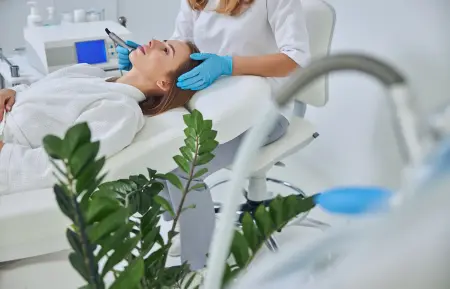GMC Registered Doctors
Expert Diagnosis & Care
Discreet & Private Clinic
Your Privacy Assured
Effective Treatment Options
Cryotherapy, Acids, Cautery
CQC Regulated Clinic
Safe & Professional Environment
Understanding Warts: Definition, Types, and Development
Warts are small, non-malignant skin growths that appear when the human papillomavirus (HPV) infects the outer layer of skin. These common skin conditions can vary in appearance—from rough, cauliflower-like textures to smooth, flat surfaces—depending on their type and location on the body. While generally harmless, warts can be aesthetically concerning and occasionally cause discomfort or irritation.
At Revitalise London, our GMC registered doctors provide expert assessment and information about warts and their management options. Our CQC-regulated Harley Street clinic delivers comprehensive care with a focus on both skin health and patient comfort.
Types of Warts: Understanding the Different Varieties
Medical dermatology recognises several distinct types of warts:
- Common Warts (Verruca Vulgaris): Typically on hands/fingers, rough, raised, cauliflower-like appearance, may have black dots.
- Plantar Warts (Verrucas): On soles of feet, often grow inward due to pressure, can be painful, may appear flat with rough surface and black dots.
- Flat Warts (Verruca Plana): Smaller, smoother, flat-topped, flesh-coloured, often appear in clusters (face, legs, hands).
- Filiform Warts: Thread-like, finger-shaped growths, common around mouth, nose, beard area.
- Periungual Warts: Appear around fingernails or toenails, rough surface, can affect nail growth.
Our GMC registered doctors provide comprehensive evaluations for accurate identification.
The Science Behind Warts: How They Develop and Spread
Understanding how warts form and spread helps manage and prevent them:
Wart Formation:
Warts develop when HPV infects the outer skin layer (epidermis), usually through tiny breaks. The virus causes excessive multiplication of skin cells, forming the wart.
Influencing Factors:
- Viral Exposure: Contact with HPV on surfaces or individuals.
- Immune System Function: Key in clearing the virus or preventing warts.
- Skin Integrity: Breaks in skin provide entry points.
- Environment: Warm, moist areas (pools, showers) favour virus survival.
- Direct skin-to-skin contact with a wart.
- Self-spread (autoinoculation) by touching own wart then another body area.
- Indirect contact via contaminated surfaces or objects.
- Sharing personal items (towels, razors, socks).
Our doctors offer guidance on preventing spread.
Monitoring and Assessing Warts: When to Seek Professional Advice
While many warts resolve, professional evaluation is recommended in certain situations:
- Wart persists beyond 3-6 months or grows despite home care.
- Wart causes pain or discomfort (especially plantar warts).
- Multiple warts appear or they recur after clearing.
- Warts are located on the face or genital area.
- You are unsure if the growth is truly a wart.
- You have a compromised immune system (e.g., diabetes, HIV, immunosuppressant medication).
At Revitalise London’s CQC-regulated clinic, our GMC registered doctors conduct thorough assessments.
Why Consider Professional Wart Management?
Consulting our GMC registered doctors offers several benefits:
Medical Considerations
- Relief from pain or discomfort caused by the wart.
- Reduced risk of spreading warts to other body parts or people.
- Management of warts prone to irritation, inflammation, or bleeding.
- Effective options for warts resistant to home treatments.
- Accurate diagnosis to rule out other skin conditions.
Aesthetic Considerations
While cosmetic concerns are valid, our clinic prioritises medical diligence:
- Thorough assessment before any intervention.
- Discussion of appropriate options based on individual circumstances.
- Realistic expectation setting regarding outcomes.
Our CQC-regulated practice upholds high clinical standards while respecting patient preferences.
Professional Wart Assessment: What to Expect
Our assessments by GMC registered doctors are thorough and informative:
A comprehensive discussion and examination including:
- Detailed medical history (previous warts/treatments).
- Discussion of symptoms (pain, discomfort).
- Comprehensive examination of the affected area(s).
- Assessment of potential spread.
- Discussion of lifestyle factors.
Our doctors may utilise specialised techniques:
- Visual & Tactile Examination: Expert identification of key features.
- Dermoscopy: Magnified view to visualise details like black dots.
- Comprehensive Skin Check: Examination for additional, unnoticed warts.
Based on assessment, we may recommend:
- Regular self-monitoring.
- Specific home care strategies.
- Appropriate professional treatment options.
- Preventive measures to reduce spread/recurrence.
- Scheduled follow-up examinations.
We prioritise patient education throughout the process.
Wart Management & Prevention: Information and Options
Understanding management approaches and preventive strategies:
Professional Wart Management Options
Medical management approaches available at our clinic may include:
- Topical Treatments: Prescription-strength preparations.
- Cryotherapy: Controlled freezing technique.
- Acid Therapy: Precise application of medical-grade acids.
- Electrocautery: Using controlled electrical heat.
- Laser Therapy: Targeting blood vessels within the wart.
- Immunotherapy: Stimulating the body’s immune response.
- Combination Approaches: Often used for resistant warts.
All options are recommended and performed by GMC registered doctors.
Prevention and Risk Reduction
Strategies to reduce risk include:
- Avoid direct contact with warts.
- Wear footwear in communal wet areas (pools, showers).
- Keep skin healthy and address cuts promptly.
- Avoid sharing personal items (towels, razors).
- Keep hands clean and dry.
- Cover existing warts with waterproof plasters when swimming.
- Maintain good foot hygiene.
Our doctors provide personalised prevention advice.
Why Choose Revitalise London for Wart Assessment and Management?
Providing expert dermatological care in a professional, regulated environment.
Dedicated Expertise and Patient-Centred Care
Choosing the right clinic for managing warts, especially persistent or cosmetically concerning ones, is important. At Revitalise London, we prioritise accurate diagnosis, effective treatments, and a supportive patient journey.
Exceptional Medical Expertise
Our GMC registered doctors possess specialised training in dermatology, ensuring accurate diagnosis and effective management of all wart types, including complex cases.
CQC Regulated Clinic
Our CQC registration guarantees adherence to the highest standards of safety, clinical governance, and patient care.
Advanced Diagnostic & Treatment Tools
We utilise tools like dermoscopy for precise assessment and offer various evidence-based treatment modalities tailored to your needs.
Patient-Centred Approach
We provide unhurried consultations, clear explanations, shared decision-making, comprehensive information, and dedicated support throughout your care.

Frequently Asked Questions About Warts and Their Management
Answers to common queries about warts.
Warts often have a rough surface and tiny black dots (clotted blood vessels). Plantar warts (verrucas) disrupt skin lines. However, other conditions like corns or calluses can look similar. Professional diagnosis by a GMC registered doctor is recommended for certainty.
Individual immune response to HPV varies greatly. Factors like frequency of exposure, skin condition (cuts/abrasions), and overall immune health influence susceptibility.
They can be effective for some common warts with consistent use over weeks/months. However, they may not work for all wart types (especially plantar warts) or locations, and risk damaging surrounding skin if not used carefully. Professional options are often more effective for persistent warts.
While most warts are benign HPV Diseases, very widespread, numerous, or unusually persistent warts can sometimes indicate an underlying issue with the immune system. A thorough assessment considers your overall health.
Supporting your immune system through a healthy lifestyle (balanced diet, adequate sleep, stress management, exercise) may help your body manage the HPV virus more effectively. However, these are complementary strategies, not standalone treatments for established warts.
Avoid sharing towels, razors, socks, and shoes. Cover warts (especially plantar warts) with plasters, particularly when barefoot in shared areas like bathrooms. Wear flip-flops in communal showers/pools. Maintain good hand hygiene after touching warts.






